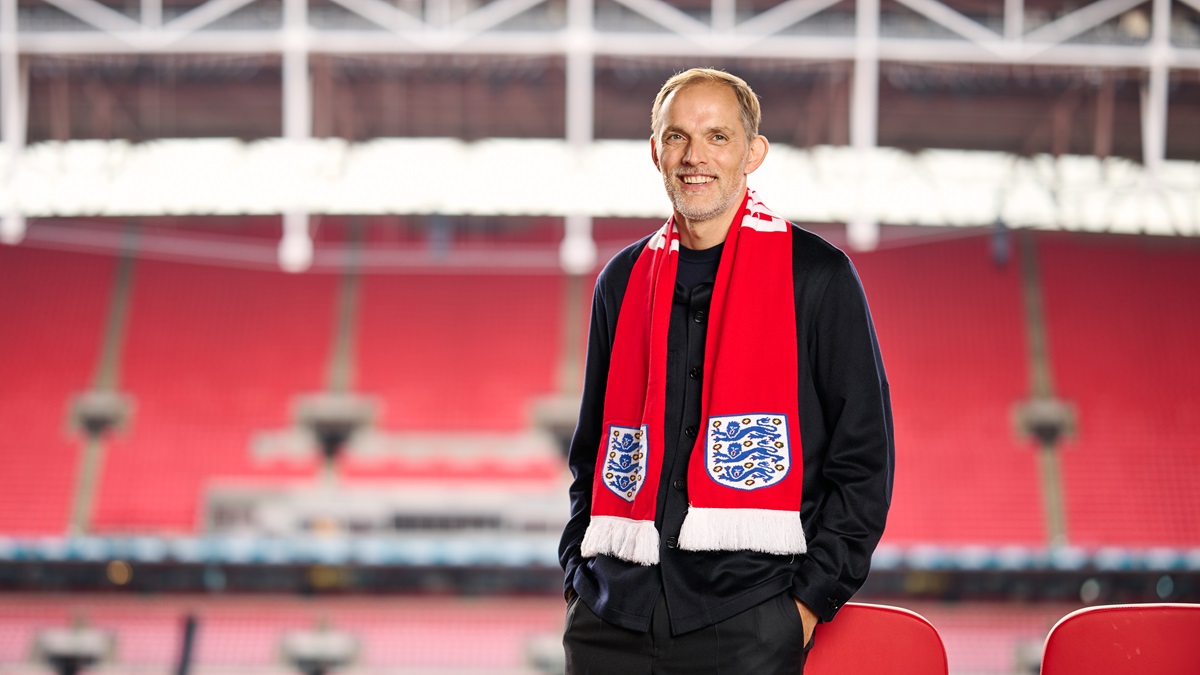English football needs a CEO factory
The appointment of a German to the role of manager of the England men's team offers a lesson in why it's important to develop and train leaders of the future

One of the top leadership roles in the UK got filled on Wednesday with the announcement that Thomas Tuchel will be the new manager of the England men’s football team. The news prompted a wave of coverage about the appointment of a German to the role, including a back-page headline from the Daily Mail that read: “A dark day for England.”
But Tuchel has a world-class pedigree. He has managed Borussia Dortmund, Paris Saint-Germain (PSG), Chelsea and Bayern Munich, four of the biggest football clubs in Europe. At Chelsea he won the Champions League in 2021, something no English manager has managed to do. Indeed, none of the leading English candidates for the job – Eddie Howe, Graham Potter and Lee Carsley – have even won a major trophy.
If this was indeed a dark day for England, it was less about the appointment of Tuchel and more about the lack of credible English candidates.
This article is an online version of our Weekend newsletter. Sign up to receive it straight to your inbox here.
The gulf between the number of top English coaches in football compared to other top European countries is staggering. If the Spain job became vacant the candidates would include Pep Guardiola, who won the Premier League with Manchester City, Mikel Arteta, who came second with Arsenal, and Unai Emery, who came fourth with Aston Villa. Meanwhile, Spaniard Luis Enrique won Ligue 1 with PSG and Xabi Alonso won the Bundesliga in Germany with Bayer Leverkusen. Yet the Spanish job isn’t about to become vacant, because Spain won Euro 2024 with Luis de la Fuente as coach, a man who has spent the past decade coaching the Spanish youth teams and being promoted through the national system until he got the top job.
The lesson here for English football – and for any organisation – is that you need to develop and train the leaders of the future, just as you do with players. If you don’t, there simply won’t be any.
There is a lot that business can learn from sport – more than we still realise. In our latest podcast episode, Dr Mark Slack, the co-founder of CMR Surgical, talks about recognising the need for business leaders to get a coach after seeing golfer Sir Nick Faldo, who was at the time world number one, working with one. “If you’re that good and you can still have a coach, then a coach should be good for anybody everywhere,” Slack says.
Slack also talks about how his promising athletics career as a youngster gave him the discipline needed to succeed in business. “Do the basics well and everything follows on afterwards,” he says.
The lack of English football coaches is an example of how sport can learn from business. The business world has recognised the importance of succession planning for years. I don’t mean the box-ticking succession planning of FTSE 100 companies either, where a list of potential options is drawn-up. I mean businesses actively training and developing leaders of the future so they can be chief executives.

One of my favourite pieces we’ve published since launching Business Leader is about the companies that have nailed this. These firms got it so right that they produced a conveyor belt of chief executives. We looked, for example, at the Mars graduate scheme in the UK in the 1980s, which produced an astonishing list of chief executives: Justin King, Richard Baker, Sara Weller, Angela Spindler and Adam Crozier.
“We also never talked about a graduate training scheme; it was a management training programme. Its sole aim was to produce managers, not take in graduates,” says Baker, who went on to lead Asda, Boots and Whitbread. “If you weren’t good enough, they moved you on. It really was up or out. A lot of people were exited, but it was done fairly and kindly. They paid for people to be outplaced.”
The Mars graduates were trained in every aspect of management, including how to give a presentation, how to write a paper, how to do an appraisal and even how to conduct a disciplinary. Baker says the training centred around Mars’s five principles of business: quality, responsibility, mutuality, efficiency and freedom. Mutuality is the one that has really stayed with him. “Mutual benefit is a shared benefit; a shared benefit will endure,” he says.
For English football – and all businesses – here is one key learning from our analysis to help develop the leaders of the future: you need to give people opportunities and jobs with real responsibilities.
This is what John Browett, who went on to work for Dixons, Apple and Dunelm, says of working for Sir Terry at Tesco: “There were huge opportunities for people. I got to launch Tesco.com, others went abroad. You had the chance to run some big businesses internationally. We were the biggest in Thailand, Korea and many other places. They got good people in and then they had good opportunities.”
However, people weren’t given a free pass to learn as they did the job, they had to perform. “I wasn’t allowed to lose money. We never had quite enough money to do what we wanted to do and that was a great discipline,” Browett recalls. “There were always trade-offs you had to make, and you had to learn how to deal with people.”
What you need to know this week
1. Big news in M&A this week, with the Financial Times revealing that Uber has explored a bid for Expedia. The US travel booking site is worth around $20bn (£15bn), while Uber has a market cap of $168bn. The deal, if it went ahead, would be Uber’s largest and continue its strategy to become a “super app” that people can use for various activities, from ride hailing to food delivery, train and holiday bookings. Interestingly, Uber’s CEO Dara Khosrowshahi was Expedia’s CEO from 2005 to 2017 and still serves as a non-executive director on its board.
2. UK inflation unexpectedly fell to 1.7 per cent in the year to September, its lowest rate in three-and-a-half years, according to the Office for National Statistics. Lower airfares and petrol prices were the main drivers of the slowdown, with inflation now below the Bank of England’s 2 per cent target. Wage data also released this week by the ONS shows staff pay, excluding bonuses, was up by 4.9 per cent year on year in the three months to August, the lowest rate for two years. With both data sets showing weaker increases, it paves the way for possible cuts to interest rates.
3. Labour held its inaugural investment summit this week, announcing £63bn in funding that the chancellor Rachel Reeves says will create 40,000 jobs. The commitments came from companies including Servicenow, Eli Lilly, Manchester Airport Group and Macquarie Group. But news that the government is considering a rise in National Insurance paid by employers overshadowed the announcement. Leading business groups have raised concerns over the rise, arguing it will make hiring staff and creating jobs harder.
4. Meta, the owner of Facebook, Instagram and Whatsapp, made headlines this week with the news it had reportedly fired staff at its offices in Los Angeles, US, for using meal vouchers to buy non-food items. Meta offers $25 (£19) in meal credits for staff working at smaller sites that don’t have canteens. But it discovered some had been using them to buy food when they weren’t in the office or to buy household items and groceries. Those who were fired were said to have repeatedly abused the system, but it marks a wider crackdown on staff perks in the tech sector.
5. The boss of Boohoo is stepping down amid a strategic review of its brands that could result in the breakup of the company. Boohoo owns brands including Debenhams, PrettyLittleThing and Karen Millen. Its board says the group is “fundamentally undervalued” following a 90 per cent drop in its share price over the past five years. John Lyttle, who joined from Primark in 2019, will remain in post until a successor is found.
Weekend reading
🆕 Who becomes an entrepreneur and when?
Joachim Klement’s Substack newsletter is almost always worth reading, but his post on Wednesday should be of particular interest to readers of this newsletter. It highlights a study of entrepreneurs in Norway that shows two things. First, that wealthy people are more likely to start a business than those with less wealth. And second, that people tend to start a business when stock market returns are high, because they feel more confident.
📘 A few ideas from Steve Jobs I found in this book
David Senra, the founder of the Founders Podcast, has nicely summarised the book Insanely Simple: The obsession that drives Apple’s success in a LinkedIn post. The book is by Ken Segall, an advertising creative director who worked closely with Steve Jobs and came up with the ‘i’ strategy behind the name of Apple products. In his post, Senra gives us 17 takeaways on the importance of simplicity, including “you will go far with a single idea expressed clearly” and “cut the product down to its essence”. Both the post and the book are worth your time.
⬅️ Yes, CEOs are moving left, but ‘woke capitalism’ is not the whole story
John Burn-Murdoch, the chief data reporter at the Financial Times, has taken a deep dive into the politics of those running businesses in the US. Using data on campaign finance contributions, it finds that over the past 20 years senior managers, the C-suite, CEOs and board members have shifted to the left. That is mirrored in the UK. The implications of that can be seen in the increasing importance of DEI and ESG in the boardroom. But its broader implications are less clear.



